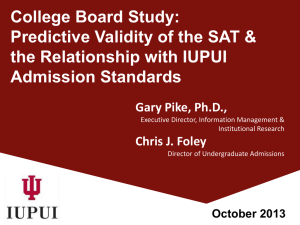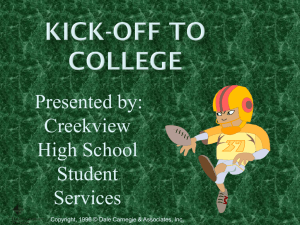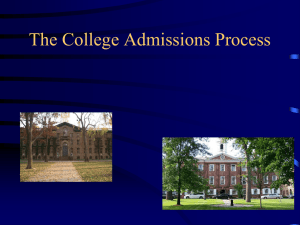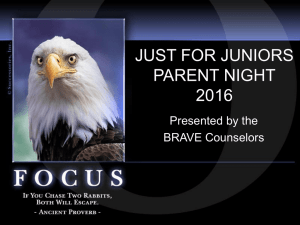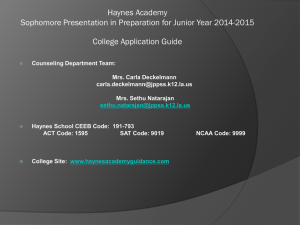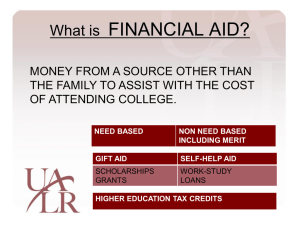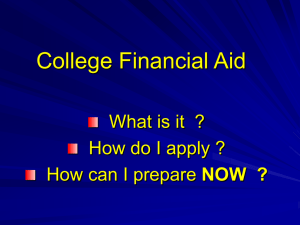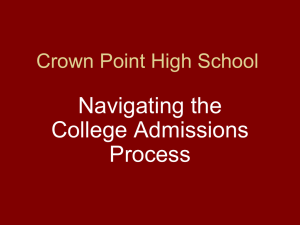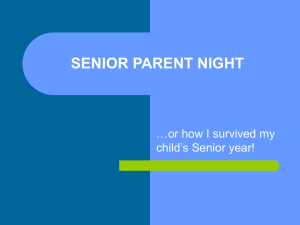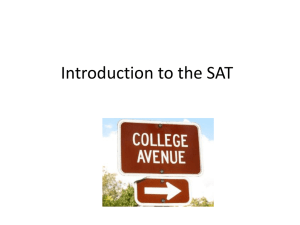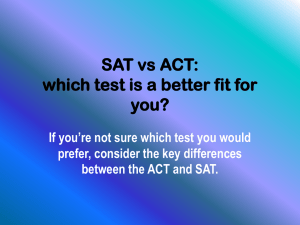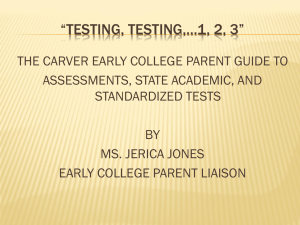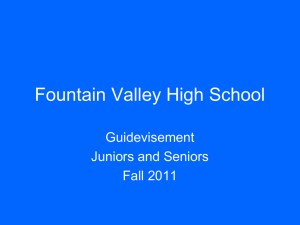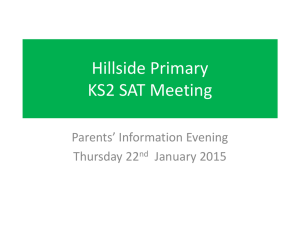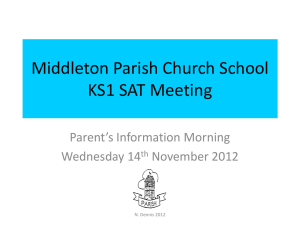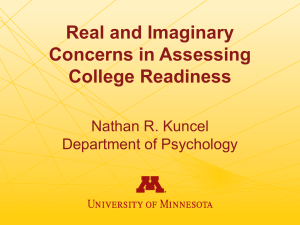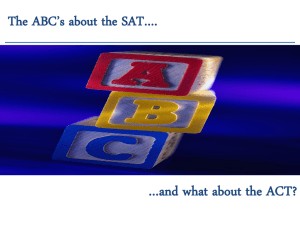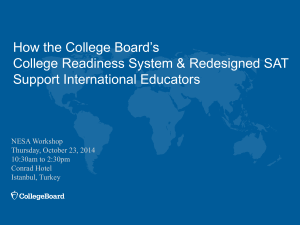Senior Post-Secondary Planning
advertisement
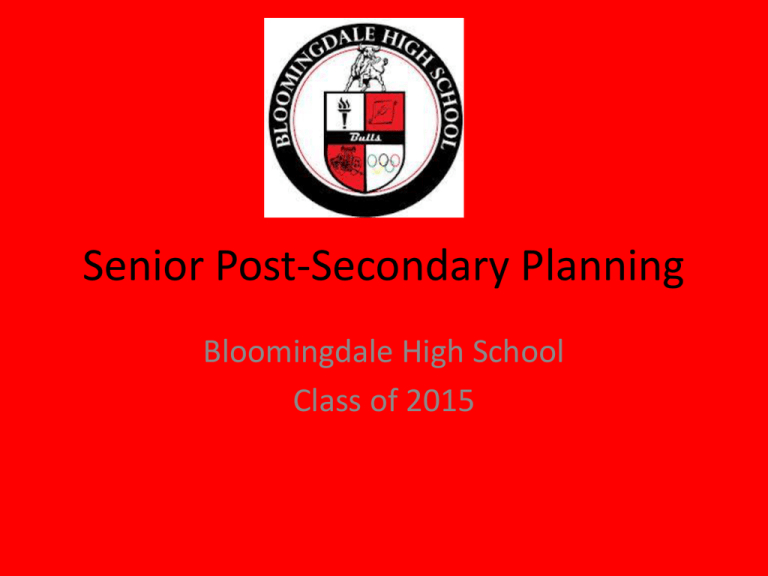
Senior Post-Secondary Planning Bloomingdale High School Class of 2015 What is post-secondary planning? • Developing a plan for life after high school. • Identifying careers that are interesting and a good fit for you. • Investigating what education/training is required for those careers. • Implementing a plan to reach your goals! Where Do I Begin??? • Identify what your interests, talents, and preference are to find a career that is a good fit for you! • Do some research online: Florida Choices Make a Plan Florida Jobs Types of Post-Secondary Education • Trade School/Tech School • Erwin Tech is an example. • Programs take between two to twenty-two months to complete. • Earn certifications in plumbing, cosmetology, nursing assistant, drafting as well as many additional options. • Financial aid is available! • HiTec Video • Field trip scheduled to Erwin Tech on November 19thcome to Guidance for an application. Types of Post Secondary Education • Two Year Colleges – Examples are HCC, TCC, and Valencia College. – Students are able to earn an Associates degree in about two years. – Can transfer to a 4 yr. school after graduation to continue education with the 2 +2 program. – Example of 2 + 2 Program at Sante Fe to UF – Programs include culinary arts, criminology, business, hospitality management, and more! Types of Post-Secondary Education • 4 year degree programs: – Earn a bachelor’s degree; many majors/program options. – Variety of public and private schools. – Require additional materials to be submitted such as transcripts, essays, letters of recommendation, and ACT/SAT test scores. – Florida Public Universities include UF, FSU, USF, and UCF. – Private Universities include U of Tampa, U of Miami, and Stetson. Standardized Tests • ACT and SAT scores required for entry in most four year universities. • Sign up on Collegeboard.org (SAT) and actstudent.org(ACT). • Can take either ACT or SAT; can also combine sections of each tests for higher score(“superscore”). SAT Vs. ACT Division of Instructional Support Department of Guidance Services SAT/ACT COMPARISONS SAT ACT Cost: $52.50 (per test) includes writing Cost: $38.00 (per test) test, additional $28.00 for late registration $54.50 Plus Writing $24.00 for late reg. General Information General Information Non-multiple choice questions included Guessing penalty Questions go from easy to hard in most sections Measures academic achievement in Critical Reading, Mathematics and Writing Testing Time Approximately 3 hours & 45 minutes Entirely multiple choice No guessing penalty Easy & hard questions mixed within sections Measures academic achievement in English, Reading, Science (plus optional writing test) Testing Time Approximately 3 hours (3 hours & 45 minutes including writing test) Test Contents Test Contents CRITICAL READING Critical Reading Sentence Level Reading ENGLISH Usage/Mechanics (Punctuation, Grammar & Sentence Structure) Rhetorical Skills (Strategy, & Style) MATHEMATICS Number & Operations Algebra I, II, & Functions Geometry Statistics, Probability & Data Analysis MATHEMATICS Pre-Algebra, Elementary Algebra, Intermediate Algebra, Geometry (Coordinate &Plane), Trigonometry WRITING Multiple Choice Grammar Usage READING Humanities, Natural Science, Prose Fiction, Social Studies SCIENCE Includes Biology, Chemistry, Physics, & Earth/Space sciences WRITING (optional) A student’s scores on the Writing Test have no effect on the score of any ACT Assessment Test or the Composite. Writing Skills Scoring Critical Reading Mathematics Writing Maximum Score Scoring 200 – 800 200 – 800 200 – 800 2400 English Mathematics Reading Science Maximum Score 1 1 1 1 1 – – – – – 36 36 36 36 36 Writing (Optional): Two scores reported Combined English/Writing Score 1 – 36 Writing test subscore 2 - 12 Military • Enlisting in the military is another option after high school. • There are five branches: Army, Navy, Marines, Air Force and Coast Guard. • After you complete your service, the GI Bill provides up to $50,000 in scholarships for college. • ASVAB is REQUIRED for enlistment-the ASVAB will be administered here on 10/23. Sign up in Guidance. Entering the Work Force • Some high school graduates enter the work force right after high school. • This allows students to save money for higher education, or to decide what they would like to study at school. • Jobs that one can obtain with only a high school diploma are limited and usually are lower-paying. Comparison of Earnings by Degree Type Tools to Help You Navigate the Process • Guidmii –Helps keep track of your GPA, graduation requirements, test scores, community service, and more. You can also search for colleges and scholarships. • Guidance website- Contains information on upcoming events, scholarships, college rep. visits, testing dates, NCAA information, and so much more! Available on the BHS app as well. What about Scholarships and Aid? • Bright Futures: 3 levels with various requirements: – FAS requires a 3.5 GPA, 1290 SAT, and 100 community service hours. Also requires 2 years of foreign language. – FMS requires a 3.0 GPA, 1170 SAT and 75 community service hours. Also requires 2 years of foreign language. – Gold Seal Vocational requires a 3.0 GPA in core classes, a 3.5 GPA in vocational classes (at least 3 full credits in a single Career and Technical Education program), a 440 on CR and Math SAT, and 30 community service hours. More about Bright Futures • FAS awards $103 per credit hour. • FMS awards $77 per credit hour. • Rates are based on enrollment at a 4yr. School; reimbursement rates at a 2yr. School are less. • GSV awards $48 per credit hour towards an A.S. degree. Additional Aid • Scholarships: – Money that does NOT need to be paid back. – Can be based on financial need or merit. – Sometimes awarded on a one-time only basis; some awards are renewable – Scholarships need to be applied for and there are a variety of types available for a wide range of students. Additional Aid • FAFSA: – Filed after January 1st. – Allows a student to access federal aid such as Pell Grants, Work-Study, and Stafford Loans. – A FAFSA is also required for colleges and universities to award need based aid. – It is best to complete the FAFSA as soon as possible; tax returns from last year can be used. Loans…. • Loans are necessary for some students to fund their education. • However-it is always important to borrow responsibly! Loans are money that needs to be paid back-with interest. • Only borrow what you need and avoid private loans if possible (through banks, credit unions, Sallie Mae, etc.) Upcoming events • College Night @ Brandon High SchoolOctober 1st from 6-8PM. • Field trips to UF, FSU, U of Miami/FIU and Erwin Tech(see Mrs. Usher for more details.) • Military Career Night @ Tampa Bay Tech October 16th at 6:00 pm. • ASVAB @BHS-October 23rd from 8 AM-12 noon. Ways to Receive Information • Twitter- @BloomingdaleCCC. • Remind- Enter this number: (727) 202-4886 with this message: @bhsccc for text updates. • Guidance Newsletters sent through Edsby. • Bloomingdale Guidance Website. • School Counseling Office-fill out a request to see form for your counselor. Questions???
